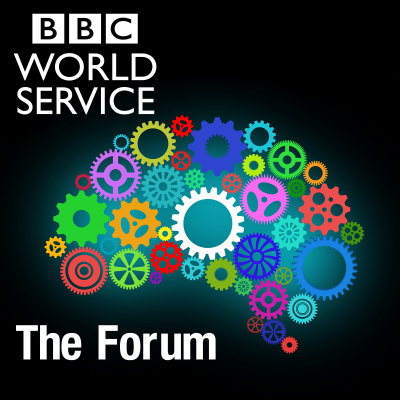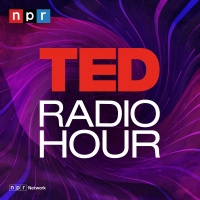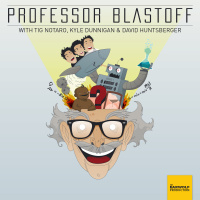Sinopse
A world of ideas
Episódios
-
Don Quixote: Spanish masterpiece
16/12/2021 Duração: 39minWith its multiple narrators, superb and complex characterisation, the influence of Don Quixote de la Mancha has been acknowledged by great writers through the ages as a masterpiece, and hailed as one of the most important novels in the history of literature.On the surface the novel appears to be a comedy – of situation, of language and of character – but its author Cervantes succeeds in making Don Quixote so much more than a series of slapstick episodes. It was written during a particularly turbulent time in Spanish politics, when both Jews and Muslims were expelled from the Iberian peninsula, and this finds its way into the novel. Bridget Kendall explores the tale of the self-styled knight Don Quixote and his sidekick Sancho Panza with Cervantes experts Ruth Fine, the Salomon and Victoria Cohen Professor in Iberian and Latin American Studies at the Hebrew University of Jerusalem; Carolyn Nadeau, the Byron S. Tucci Professor of Hispanic Studies at Illinois Wesleyan University; and Edwin Williamson, the King
-
Algae: Slime life
09/12/2021 Duração: 39minThey’re slimy and slippery. They’re part of the green film you see on garden ponds. They can clump together and wash up on the shores of beautiful beaches. A lot of them are invisible to the naked eye. These underappreciated organisms called algae are indispensable to the presence of life on earth but not all is straightforward about them. They can be single celled or multi cellular. They can be ugly and slimy or sometimes beautiful: indeed are even a tourist attraction. They may be found in the sea or on land. They can be life-creating and yet life-destroying and toxic in excess. So perhaps it’s time we paid more attention to algae and their evolution. Rajan Datar is joined by Ruth Kassinger, author of Slime: How algae created us, plague us and just might save us; Dr Brenda Soler-Figueroa, a marine scientist at the Smithsonian Environmental Research Centre; Dr Gothamie Weerakoon Senior Curator of Lichens and Slime Moulds at the Natural History Museum of London and author of Fascinating Lichens of Sri Lank
-
The original Goths
02/12/2021 Duração: 39minThe Goths were a Germanic tribe infamous for their brief sack of Rome in 410 AD but their cultural and political influence was felt throughout Europe for centuries. They re-shaped the Balkans, preserved the Roman way of life in Italy and presided over a cultural flourishing in Spain. But how, many centuries after their demise, did they come to give their name to an important architectural style in medieval Europe and, in the 20th century, to a subculture popular all over the world?Bridget Kendall talks all things Gothic with David Gwynn, historian at Royal Holloway, University of London, and author of Goths, the Lost Civilisation. Also on the panel are Janina Ramirez, a cultural historian, broadcaster and author who focuses on the Middle Ages, based at the University of Oxford, and Mischa Meier, professor of ancient history at the University of Tubingen in Germany.
-
Laskarina Bouboulina, the mother of modern Greece
25/11/2021 Duração: 39minThe 1821 Greek war for independence from the Ottoman empire became an inspiration for people all over Europe who wanted to dismantle the old multi-ethnic empires. But it is less well known that a number of women played key roles in the uprising. In this programme, Bridget Kendall and guests focus on Laskarina Bouboulina, perhaps the best known of Greek women freedom fighters. For the last two centuries, Bouboulina's deeds as as a brave sea captain and a generous financier of the uprising have enthralled people in Greece and elsewhere but how many of these stories are based in fact? And what is the significance of Bouboulina today?To find out Bridget is joined by: Dr. Margarite Poulos, a historian of modern Greece from Western Sydney University whose book Arms and the Woman surveys the role of Greek women in the country's military struggles; Dr. April Kalogeropoulos Householder from University of Maryland, Baltimore County, who has not only written about Laskarina Bouboulina but also made a documentary film
-
Mary Somerville: The queen of 19th-Century science
18/11/2021 Duração: 39minFor someone who was largely self-taught, Mary Somerville's rise to renown in the male-dominated world of science was quite remarkable. Although women were barred from being members of the learned societies where knowledge was shared in the early 19th-Century, Somerville found alternative ways to become one of the most respected figures in maths and science of her day.Scottish-born Somerville played a crucial role in communicating the latest findings in science through a series of successful books. She regretted never making any original discoveries herself however, so does her experience suggest we should re-evaluate the role of originality in science?Bridget Kendall is joined by Jim Secord, emeritus professor of History and Philosophy of Science at the University of Cambridge, who has edited the works of Mary Somerville; Dr Brigitte Stenhouse, lecturer in the History of Mathematics at the University of Oxford whose doctoral thesis looked at the mathematical work of Mary Somerville; and Ruth Boreham, former p
-
The Malayan Emergency
11/11/2021 Duração: 39minOne of the earliest Cold War conflicts was a 12-year guerrilla war commonly known as the Malayan Emergency and fought from 1948 in the jungles of what is now Malaysia. This communist insurgency was fuelled not only by ideology but also by the desire for Malayan independence from British colonial rule. There have been a number of books and documentaries devoted to the subject but relatively few in English capture the experiences of the Chinese community in Malaya that was at the centre of the Emergency.Rajan Datar is joined by three guests, all with family links to the Emergency: Sim Chi Yin, a photographer and artist from Singapore whose book She Never Rode that Trishaw Again tells the story of her grandmother widowed during the war in Malaya; Show Ying Xin, a postdoctoral fellow at the at the Australian National University’s Malaysia Institute in Canberra; and Rachel Leow, Associate Professor in Modern East Asian History at the University of Cambridge and author of Taming Babel: Language in the Making of Ma
-
The Devils: Dostoevsky’s novel of political evil
04/11/2021 Duração: 40minThe Devils, The Possessed, or Demons, as it’s also known in translation, is Fyodor Dostoevsky’s most political novel but it’s also his bleakest and funniest. It’s a hundred and fifty years since its publication and two hundred years since its author’s birth. The novel tells the story of a group of young revolutionaries who run riot in a small provincial town in Russia, all under the indulgent eye of their elders, the liberal and progressively minded elite. It is a grim prophecy of totalitarian rule in the 20th century in what is a penetrating psychological study of the human consequences of extreme philosophical ideas.Joining Bridget Kendall to discuss Dostoevsky and his novel The Devils or Demons, is Tatyana Kovalevskaya, Professor at the Russian State University for the Humanities in Moscow and the author of the bilingual edition Fyodor Dostoevsky on the Dignity of the Human Person; Carol Apollonio, Professor of the Practice of Slavic and Eurasian Studies at Duke University in the United States and Presiden
-
A focus on spectacles
28/10/2021 Duração: 39minIf you had to name the innovations that have transformed human civilisation, you might suggest the printing press or the Internet, but the humble pair of spectacles has also revolutionised the way many of us experience the world. It's said that an astonishing three quarters of those in the US use glasses or contact lenses to correct their vision. And the World Health Organisation estimates that more than a billion people in low-and-middle income countries are living with sight problems that could be corrected by the right pair of specs. But how and when were glasses first invented? What impact have they had on societal development? And what are some of the ways we've stigmatised, or even elevated, people who wear them?Joining Rajan Datar to explore the history of spectacles are Travis Elborough, a historian of popular culture from the UK. He’s recently published a book called Through The Looking Glasses: The Spectacular Life of Spectacles; Stefana Sabin, a German literary scholar and the author of In The Blin
-
Sarah Bernhardt: Queen of stage and screen
21/10/2021 Duração: 39minWhether photographed in a coffin or depicted on an Art Nouveau poster, the French actor Sarah Bernhardt knew exactly how to get maximum publicity. Although her first outings on the stage were unremarkable, she refined her skills and rose to become the leading actor of her generation and a world-famous name. Her life off-stage was a further source of endless fascination, her eccentric and occasionally arrogant behaviour only adding to her allure. Her critics saw her as manipulative and hackneyed. For her admirers, seeing Bernhardt ‘die’ on stage was a moment to be treasured for ever.Bridget Kendall charts Sarah Bernhardt’s life and career with John Stokes, emeritus professor of modern British literature at King’s College London and author of The French Actress and Her English Audience; Victoria Duckett, senior lecturer in screen and design at Deakin University in Melbourne and the author of Seeing Sarah Bernhardt: Performance and Silent Film; and Sharon Marcus, the Orlando Harriman professor of English and c
-
A dirty history of diamonds
14/10/2021 Duração: 39minWe seem to have an almost insatiable appetite for the glitter and sparkle of diamonds. Yet transforming these stones into jewels fit for princesses and film stars involves a long chain of production and distribution. And the diamond industry has long been bound up with a much darker side: the exploitation of workers, environmental damage, all-powerful monopolies and violent mafias, not to mention the so-called Blood Diamonds used to finance armed conflict. So how is the industry trying to clean up its image and regulate the trade?Joining Bridget Kendall to discuss the history of the diamond trade are:Dr. Lansana Gberie, former coordinator for the UN Security Council Panel of Experts on Liberia. He is the author of A Dirty War in West Africa: The RUF and the Destruction of Sierra Leone. He’s also Sierra Leone’s current Permanent Representative to the UN in Geneva and the Sierra Leonean Ambassador to Switzerland - though his contributions to this programme are in a personal capacity.Ian Smillie, founder of the
-
The story of Evita
07/10/2021 Duração: 39minEva Peron rose from a childhood of poverty to become one of the most powerful figures in Latin America. An illegitimate small town girl, she smashed class and gender barriers to become Argentina’s controversial First Lady. Loved and loathed, Rajan Datar discusses her life, work and remarkable afterlife with biographer Jill Hedges, historian Ranaan Rein, and cultural theorist Claudia Soria.[Photo: Eva Peron in 1951. Credit: Keystone/Getty Images]
-
Sushi: The Japanese dish with an ancient tradition
30/09/2021 Duração: 39minIt’s one of the most popular dishes in the world today, but the story of sushi can be traced back more than 2,000 years. The earliest records document a preserved fish dish in ancient China and it later became a medieval luxury in Japan, before evolving into a variety of different regional styles and recipes. Today, thanks to waves of migration from Japan, there is a veritable smorgasbord of international varieties… California roll, anyone? Joining Rajan Datar to discuss the history of sushi are James Farrer, Professor of Sociology and Director of the Graduate Programme in Global Studies at Sophia University in Tokyo. He is the author of Globalisation and Asian Cuisines; Eric C. Rath is Professor of Premodern Japanese History at the University of Kansas in the US. He’s the author of Oishii: The History of Sushi; and Michelin-starred Japanese sushi master, Endo Kazutoshi, who is head chef at The Rotunda in London.Presenter: Rajan Datar[Image: Young woman eating sushi; Credit: Getty Images]
-
Toni Morrison: The legacy of a literary legend
23/09/2021 Duração: 39minThe American writer Toni Morrison once said, “If there’s a book that you want to read, but it hasn’t been written yet, then you must write it.” It was an urge which in her case yielded a rich array of novels, children’s books, plays and essays. Toni Morrison stands tall, as the first black woman of any nationality to be awarded the Nobel Prize for Literature. Celebrated for her masterpiece Beloved, she remains a towering figure, one of the most well-known and oft-taught authors of our age. Since her death in August 2019, many have been reassessing her multiple legacies: as a novelist, cultural critic, and editor.Joining Bridget Kendall to explore the life, work and impact of Toni Morrison are Dana Williams, Professor of African American Literature at Howard University in Washington DC and current President of the Toni Morrison Society; Janis A. Mayes, Emerita professor of African American Studies at Syracuse University, US; and Aretha Phiri, Associate Professor at Rhodes University in Grahamstown / Makhanda,
-
Algorithms: From the ancients to the internet
16/09/2021 Duração: 39minHidden from view, complex to understand and often controversial, algorithms are at the heart of computer coding that underpins modern society. Every time we search the internet, every time we pay by credit card, even the romantic partners suggested to us by online dating sites – they’re all powered by algorithms. And their reach is growing all the time, as some societies use them to automate decisions regarding criminal justice, mortgage applications and job recruitment.The history of algorithms is surprisingly ancient, stretching back to the Babylonian empire where large societies required a systematic way to count and order different aspects of citizens’ lives. Today some people are questioning their use, as some algorithms have been shown to replicate bias and there are fears that algorithms have the potential to undermine democracy.Bridget Kendall is joined by Ramesh Srinivasan, Professor in the Department of Information Studies at the University of California Los Angeles and the author of Beyond the V
-
Louder! How the electric guitar conquered popular music
09/09/2021 Duração: 39minWhether it be a kerrang, a chop, a blistering solo, some finger picking or a subtle flange, the electric guitar is one of the defining sounds of the 20th century. Without it – and its constant companion, the amplifier - popular culture would be unrecognisable today: no big gigs, no stadium concerts. And almost certainly no rock music. But why was it needed and how was it created? Who were the pioneers of the technology and who were the early-adopting exponents?Rajan Datar and his three guest experts delve into the roots of this iconic instrument. Monica Smith is Head of Exhibitions and Interpretation for the Smithsonian's Lemelson Center for the Study of Invention and Innovation. Among the many projects she has curated at the museum is From Frying Pan to Flying V: The Rise of the Electric Guitar. Paul Atkinson is professor of Design and Design History at Sheffield Hallam university and the author of Amplified: A Design History of the Electric Guitar. HP Newquist is the founder of the National Guitar Museum i
-
Luigi Pirandello: Italian dramatist who brought chaos to the stage
02/09/2021 Duração: 39minIt’s a hundred years since the infamous premiere of Luigi Pirandello’s experimental play Six Characters in Search of an Author, when an enraged Rome theatre audience yelled abuse at the Italian playwright and chased him out of the theatre. Since then, the play has gained iconic status as a piece of theatre which helped move Western culture into modernity. But what of the author of this play? He was a complex figure who found inspiration from his wife’s madness as well as the actors he worked with, and he formed an unlikely association with the Italian Fascist Prime Minister Benito Mussolini which still intrigues theatre critics and academics to this day. Joining Rajan Datar to discuss Luigi Pirandello and his work are Guido Bonsaver, Professor in Italian Cultural history at the University of Oxford; Dr Enza de Francisci, lecturer in Translation studies at the University of Glasgow, who specialises in Pirandello’s Sicilian identity and his portrayal of women, and is the author of A 'New' Woman in Verga and Pir
-
Mars: A history of the Red Planet
26/08/2021 Duração: 39minWith three separate missions exploring the Red Planet in 2021, Mars is once again under the spotlight. But to tell the truth, it’s never been away. Mars has fascinated people for centuries with its seemingly curious motion in the night sky, its red colour and the eternal question as to whether it may or may not harbour life, past or present.Since the 1960s, robotic exploration of Mars has provided us with evidence that it may have had periods where it was once a warm and wet planet. That’s in contrast to the arid, cold celestial object we know today. The harsh Martian atmosphere presents challenges for anyone hoping to land humans on the planet. But nevertheless, the next few decades could potentially see either a private commercial operator, a national space agency or an international partnership make history with the planet’s first human exploration. Some have even argued that’s a first step to ‘terraforming’ or populating Mars in the future.Bridget Kendall is joined by Michael Meyer, the lead scientist for
-
A radiant light: The Indonesian poet Amir Hamzah
19/08/2021 Duração: 39minThe writer Amir Hamza is a national hero in Indonesia celebrated for both his poetry and his role in the development of the country’s national language. Hamza was an emotional man who struggled with thwarted love and inner conflict and created a beguilingly intense body of work. His poetry paid homage to Malay literary tradition infused with Islamic mysticism but also reflected new ideas springing up in the artistic circles in Java where he worked in the 1930s. Towards the end of that decade events conspired to enforce his return to the family home in Sumatra and ultimately led to his becoming a tragic victim of brutal retribution during Indonesia’s transition to independence. Rajan Datar is joined by Ayu Utami, an award-winning Indonesian novelist, playwright and broadcaster; Ben Murtagh, Reader in Indonesian and Malay at SOAS, University of London, and managing editor of the journal Indonesia and the Malay World; and Taufiq Hanafi, an Indonesian literary scholar currently at the Royal Netherlands Institut
-
Sailing by the stars: The pioneering voyages of David Lewis
12/08/2021 Duração: 39minDavid Lewis was of one of the most remarkable nautical explorers of modern times. In the mid-1960s, he took his wife and two small daughters - who were less than five years old - on a sailing trip around the world in a small catamaran. What is more, for one part of the journey, he rejected standard 20th-Century navigational equipment and relied on much older methods of finding his way across the Pacific. In fact, it was his lifelong goal to prove that ancient seafaring methods were still valuable and his research helped revive ancient Polynesian navigation methods. In his more than eventful life, he also wrote a dozen books, practised as a GP in London’s East End and tackled many unclimbed peaks as a mountaineer. And he undertook hazardous trips to the Antarctic including one in which he was presumed dead.Rajan Datar is joined by David’s son Barry, who is also an accomplished sailor and who accompanied David on some of his seminal voyages; Dr. Christina Thompson, the editor of Harvard Review and the author
-
Inside the mind of crime writer Patricia Highsmith
05/08/2021 Duração: 42minPatricia Highsmith was one of the most successful suspense writers of the 20th century. Known especially for her novels The Talented Mr. Ripley, Carol and Strangers on a Train, she created complex and alluring characters, capable of terrible things and at the same time deeply human. Yet for much of her life, Highsmith herself remained an enigmatic figure, often seen as eccentric, troubled and difficult. But she had a circle of close friends who were loyal to the end.Presenter Bridget Kendall is joined by Andrew Wilson, author of the first biography of Highsmith, and Vivien De Bernardi, a close friend of Highsmith's during her later years in Switzerland.Produced by Jo Impey for BBC World ServiceImage: Patricia Highsmith at her home in France, 1976 Image credit: Derek Hudson, Getty Images









